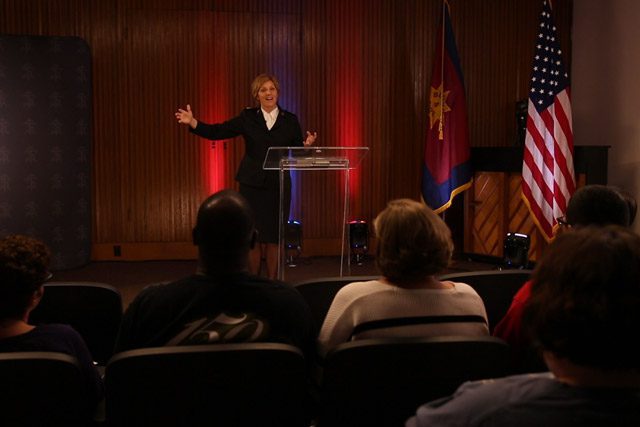Listen to this article
Listen to this article
Loading
Play
Pause
Options
0:00
-:--
1x
Playback Speed- 0.5
- 0.6
- 0.7
- 0.8
- 0.9
- 1
- 1.1
- 1.2
- 1.3
- 1.5
- 2
Audio Language
- English
- French
- German
- Italian
- Spanish
Open text
the spice box “nuturing the seed within us”. by sharon robertson, lt. colonel. mile after mile of arid high desert; extensive and almost incredible expanses of ancient lava flows; upthrust cliffs: red and black, brown, yellow and shining white—for the past several days we have been driving among almost incredible reminders of the geologically violent past of america’s great basin. the awesome landscape slides by, waves of heat rising from the roadway ahead—all viewed from the closed windows of our comfortably cool, air-conditioned car. believe me, we are thanking god for air conditioning. here and there—few and far between—are the most amazing sights of all: lush green fields of crops; golden-ripe grain waving in the desert breeze; cattle, horses and sheep grazing in seeming perfect contentment. we could not help but be reminded of the words of isaiah: for the lord shall comfort zion: he will comfort all her waste places; and he will make her wilderness like eden, and her desert like the garden of the lord; joy and gladness shall be found therein, thanksgiving, and the voice of melody (isa. 51:3 kjv). but as we drove on, the words of jesus to his disciples came to mind with even more impact: “the farmer sows the word. some people are like seed along the path, where the word is sown. as soon as they hear it, satan comes and takes away the word that was sown in them. others, like seed sown on rocky places, hear the word and at once receive it with joy. but since they have no root, they last only a short time. when trouble or persecution comes because of the word, they quickly fall away. still others, like seed sown among thorns, hear the word; but the worries of this life, the deceitfulness of wealth and the desires for other things come in and choke the word, making it unfruitful. others, like seed sown on good soil, hear the word, accept it, and produce a crop—thirty, sixty or even a hundred times what was sown” (mark 4:14-20 niv). the green and gold acres of thriving crops in the desert are not accidents of nature, the simple coming together of the right conditions. they are the result of careful planning and incredible determination. rocks by the thousands have been moved to clear the land. untold hours have been given to plowing, preparing the soil, fertilizing land to which life-giving water must be applied in abundance: a commodity in short supply in this arid land. all this must be brought to the inhospitable desert environ and maintained through heat and cold and storms both wet and dry. and i wonder if, in spite of the warning words of jesus, we who claim to be his followers are willing to put the same kind of devotion, dedication and just plain hard work into maintaining our relationship with him. a crop cannot be planted and then totally neglected. it requires attention: watering, clearing away the weeds and thorns that threaten, protection from the harmful beasties that would destroy it before ever it had a chance to ripen, and from the heat and cold and storms that would flatten the fields before harvest. it requires careful pruning or thinning at the proper time, even when the farmer feels reluctance to do so. (my peach tree had so many peaches on its branches that i, an amateur at best, couldn’t bear to thin the fruit. it got so heavy it broke the branches!) the fact is inescapable: if you want a good harvest, you have to work hard to tend the garden! and if we want our relationship with christ to be one that is full, mature, joyous, sustaining us through whatever ills may come our way—if we want a fruitful christian life that proclaims christ in the midst of a hostile environment, we must be willing to exert real effort—to work hard—to develop the seed of the fruit of the spirit god has implanted in us.
Open context player
Close context player
Plays:-Audio plays count
the spice box “nuturing the seed within us”. by sharon robertson, lt. colonel. mile after mile of arid high desert; extensive and almost incredible expanses of ancient lava flows; upthrust cliffs: red and black, brown, yellow and shining white—for the past several days we have been driving among almost incredible reminders of the geologically violent past of america’s great basin. the awesome landscape slides by, waves of heat rising from the roadway ahead—all viewed from the closed windows of our comfortably cool, air-conditioned car. believe me, we are thanking god for air conditioning. here and there—few and far between—are the most amazing sights of all: lush green fields of crops; golden-ripe grain waving in the desert breeze; cattle, horses and sheep grazing in seeming perfect contentment. we could not help but be reminded of the words of isaiah: for the lord shall comfort zion: he will comfort all her waste places; and he will make her wilderness like eden, and her desert like the garden of the lord; joy and gladness shall be found therein, thanksgiving, and the voice of melody (isa. 51:3 kjv). but as we drove on, the words of jesus to his disciples came to mind with even more impact: “the farmer sows the word. some people are like seed along the path, where the word is sown. as soon as they hear it, satan comes and takes away the word that was sown in them. others, like seed sown on rocky places, hear the word and at once receive it with joy. but since they have no root, they last only a short time. when trouble or persecution comes because of the word, they quickly fall away. still others, like seed sown among thorns, hear the word; but the worries of this life, the deceitfulness of wealth and the desires for other things come in and choke the word, making it unfruitful. others, like seed sown on good soil, hear the word, accept it, and produce a crop—thirty, sixty or even a hundred times what was sown” (mark 4:14-20 niv). the green and gold acres of thriving crops in the desert are not accidents of nature, the simple coming together of the right conditions. they are the result of careful planning and incredible determination. rocks by the thousands have been moved to clear the land. untold hours have been given to plowing, preparing the soil, fertilizing land to which life-giving water must be applied in abundance: a commodity in short supply in this arid land. all this must be brought to the inhospitable desert environ and maintained through heat and cold and storms both wet and dry. and i wonder if, in spite of the warning words of jesus, we who claim to be his followers are willing to put the same kind of devotion, dedication and just plain hard work into maintaining our relationship with him. a crop cannot be planted and then totally neglected. it requires attention: watering, clearing away the weeds and thorns that threaten, protection from the harmful beasties that would destroy it before ever it had a chance to ripen, and from the heat and cold and storms that would flatten the fields before harvest. it requires careful pruning or thinning at the proper time, even when the farmer feels reluctance to do so. (my peach tree had so many peaches on its branches that i, an amateur at best, couldn’t bear to thin the fruit. it got so heavy it broke the branches!) the fact is inescapable: if you want a good harvest, you have to work hard to tend the garden! and if we want our relationship with christ to be one that is full, mature, joyous, sustaining us through whatever ills may come our way—if we want a fruitful christian life that proclaims christ in the midst of a hostile environment, we must be willing to exert real effort—to work hard—to develop the seed of the fruit of the spirit god has implanted in us.
Listen to this article












